Addiction Dogma Finds New Directions
Geoffrey Schoenbaum investigates how our insight (or lack thereof) shapes behavior.
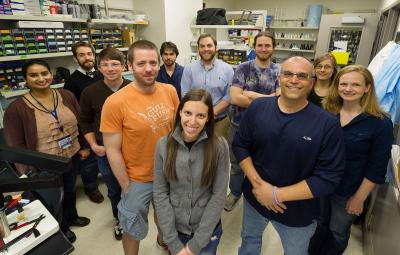
Dr. Schoenbaum's IRP team
Addictions take various forms, often exacting high tolls from addicts and the people around them, which is why scientists pursue different strategies to understanding the etiology of addictive behaviors.
One approach gaining increased focus is to consider how drug use can cause physical changes in the brain that, in the context of an individual’s genetics, can lead to addiction. Taking traditional views one step further, to look at how drugs influence learning and decision making, Geoffrey Schoenbaum, M.D., Ph.D., studies addiction as a behavioral disorder best understood on a neural systems level.
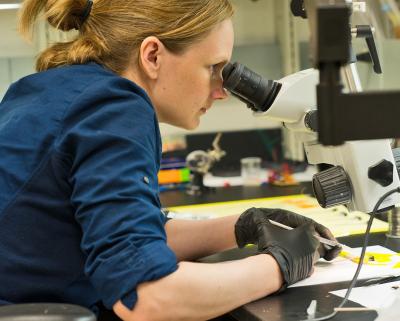
Graduate student Heather Weid prepares microelectrodes that measure brain activity in animal models
“Addiction is clearly something that’s outside the realm of normal behavior,” Schoenbaum says. “But we have to understand that the underlying etiology of addiction is a mix of what you’re born with and your individual life experiences.”
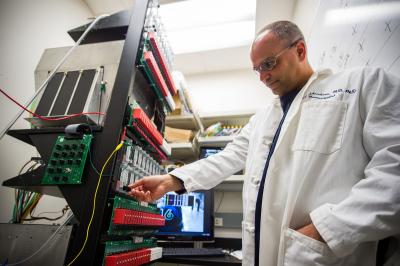
Dr. Schoenbaum uses odors to develop and test decision-making in rats
Schoenbaum’s lab approaches addiction research by studying basic mechanisms of behavior control. The rationale for this approach is strikingly illustrated by the DSM-IV—the Diagnostic and Statistical Manual of Mental Disorders, 4th Edition—in which the definition of “addiction” has little to do with drug use.
“Most of the criteria are really due to an inability to regulate behavior in the face of all sorts of consequences that you and I would have no trouble avoiding,” Schoenbaum explains. “So, it really comes down to an inability to use information to control behavior, and that’s something we can study in really simple ways.”
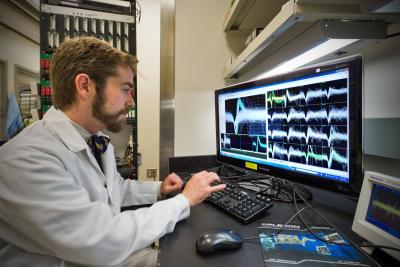
Postdoctoral fellow Brian Sadacca monitors electrical activity in a single neuron, later analyzing the data to better understand brain function
One experiment trains rats to expect a tasty food reward when a light turns on. Then, when the value of the food changes, for example, by pairing it with illness, the researchers can investigate what happens behaviorally. Can the rats infer that if the light means food, and the food makes them sick, then maybe they should not respond to the light?
Schoenbaum’s lab has shown that both wild type rats and rats with an abnormal orbitofrontal cortex can learn to respond perfectly to the cues, but when presented with the light cue again, after a change in the value of the food, only the wild type rats can change their behavior to avoid the food. Animals with a damaged orbitofrontal cortex do not seem to use cues to guide appropriate behavior.
“To me, this suggests that drugs may somehow replicate the effect of a lesion within the orbitofrontal cortex,” Schoenbaum says. “So to investigate this further, we’ve started to look at signaling within this area of the brain to determine what might result in this inability to change behavior based on a known change in the outcome.”
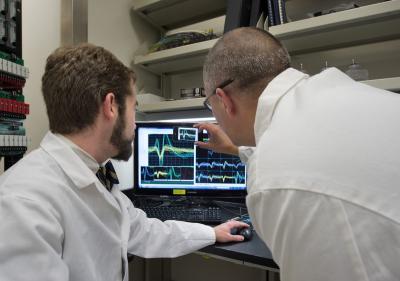
Sharing a rare find: dopaminergic neurons are relatively few in number and provide unique insight into how the brain responds to cues that predict reward
This broad concept—the ability to change behavior based on the outcome—was described by pioneers in the field of human addiction, Rita Goldstein and Nora Volkow [NIDA Director, 2012], as “insight,” a concept traditionally more applicable to humans than rats. Goldstein and Volkow’s work on drug addiction in humans uses behavioral paradigms different from those in animal studies, resulting in the idea that what drug addicts lack is insight. Schoenbaum’s research into the “outcome-guided” (or “goal-directed”) behaviors observed in animal models aligns elegantly with the anthropomorphic concept of insight.

Dr. Schoenbaum (left) and postdoctoral fellow Joshua Jones discuss ideas for pushing the lab’s research forward
The challenge for Schoenbaum and others in the field is to understand how animal behavior maps to human behavior. Obviously, it’s not possible to test for insight in rats as it is done in humans, thus, as part of the IRP, Schoenbaum has actively partnered with other researchers who are studying addiction in humans to help design behavioral tasks that can then be operationalized in the rat model.
“I’m under no illusions that rats are as complex as humans, but I strongly believe that they use the same elementary building blocks that we use to make decisions,” Schoenbaum says. “Only by understanding that process can we start to have a better grasp on the underlying behavioral deficits observed in addiction.”
Geoffrey Schoenbaum is a Senior Investigator and Chief of the Cellular Neurobiology Research Branch and Behavioral Neurophysiology Neuroscience Section at the National Institute on Drug Abuse (NIDA).
This page was last updated on Wednesday, May 24, 2023